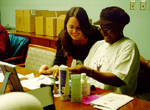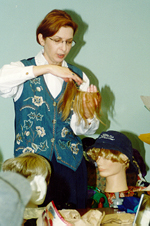Look Good...Feel Better’
by Cindy Abole
Public Relations
For the past eight months, Ada Moses’ goal has been to get well.
A breast cancer survivor now undergoing radiation therapy, Moses was learning how to cope with some of cancer’s physical changes without losing her dignity.
 American
Cancer Society staffer Laurie Cook, left, assists Ada Moses with make up
and lotions as part of the Look Good...Feel Better program held at Hollings
Cancer Center. The free program is open to anyone going through cancer
treatment.
American
Cancer Society staffer Laurie Cook, left, assists Ada Moses with make up
and lotions as part of the Look Good...Feel Better program held at Hollings
Cancer Center. The free program is open to anyone going through cancer
treatment.
Moses was among six women attending the American Cancer Society’s Look Good...Feel Better program at Hollings Cancer Center. The two-hour program is designed to help female cancer patients learn new ways to enhance their appearance and self-image. It’s sponsored by the American Cancer Society (ACS), the Cosmetics, Toiletry and Fragrance Association and the National Cosmetology Association since 1989.
“Since I finished chemotherapy and began radiation, I haven’t really been taking care of myself,” Moses said. “When you have cancer and don’t feel well, it's easy to neglect yourself.”
The program is sponsored locally by Charleston’s ACS and is scheduled several times a year at Lowcountry hospitals and cancer centers. Look Good...Feel Better is part of a national awareness program and is offered to any patient who is undergoing treatment for cancer.
“The program has been well-received among participants,” said Andrea Voden, community cancer control manager of Charleston’s ACS. “It’s designed to help women cope with appearance-related side effects related to cancer therapy.”
Participants are greeted by Coby Roest, a familiar face among Hollings patients. A thoracic oncology coordinator, Roest, R.N., has been a speaker with the Look Good...Feel Better program for the past year. It’s her job to brief patients about the medical aspects of cancer and review the practical benefits of the program.
“It’s important that cancer patients use fresh make up, practice hand washing and do little things to help them feel good,” Roest said. “Sometimes that’s all it takes to help them through a day.”
 Licensed
cosmetologist Nan Gearhart demonstrates some new ideas using hair pieces
and hats.
Licensed
cosmetologist Nan Gearhart demonstrates some new ideas using hair pieces
and hats.
Roest provides a cancer overview explaining basic hematology—differences in blood cell counts and the downside of radiation and chemotherapy. For example, radiation therapy often produces a sunburn effect causing dry skin for many patients. Hair loss and nail brittleness are more common for persons undergoing chemotherapy.
At the workshop, an ACS representative and licensed volunteer cosmetologists provide an educational and hands-on experience devoted to hair and the application of makeup. The program emphasizes the importance of good hygiene to decrease infection since the body’s immune system is compromised by the effects of radiation and chemotherapy. Each participant receives a complimentary cosmetics kit, which includes fragrance-free, hypoallergenic make up donated by some of the country’s leading cosmetics manufacturers.
A segment of the workshop focuses on coping mechanisms for patients dealing with hair loss. Patients learn about the use and care of wigs, turbans and scarves. Because some wigs can be expensive, the Cancer Society can help patients find and meet financial reimbursements that are covered under certain insurance guidelines and ACS policies.
The National Cosmetology Association helps to locate and recruit area cosmetologists depending upon an area’s needs and response. Participating cosmetologists can also provide private services for makeup advice and wig trimming.
In June, Hollings will open the Looking Glass boutique, a non-profit shop dedicated to providing for the needs of patients undergoing cancer recovery therapy. “This will be a wonderful collaboration between MUSC and the Look Good...Feel Better program,” Voden said. “Both programs will help women get the tools that they need that’s both in-house and convenient.”
For participants, the Look Good...Feel Better workshop offers additional benefits. It’s an outlet and support group for cancer patients. Most participants who attend the workshop are quiet and withdrawn at the beginning. After a few hours, they’re smiling and laughing together, according to Voden. The program also encourages patients to exchange names and phone numbers and provides a list of area cancer-related support groups.
“I think the reason the program works so well at Hollings is because of the environment we provide,” Roest said. “Patients realize that I work closely with the physicians, oncologists and staff and that makes them feel comfortable. These women are both wonderful and courageous. “Look Good...Feel Better is much more than just makeup and a turban,” Voden said. “It’s about women coming together, bonding and providing encouragement.”
For more information about the Look Good...Feel Better program or about cancer, visit the American Cancer Society website at <http://www.cancer.org> or contact the Charleston office at 723-3618 or 1-800-ACS-2345.